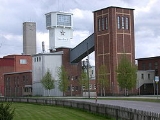
Zinkgruvan
Encyclopedia
Zinkgruvan is a locality situated in Askersund Municipality
, Örebro County
, Sweden
with 383 inhabitants in 2005.
It is situated close to Sweden's second largest lake, Vättern
. The village is famous for its mining industry started by the belgian company Vieille Montagne
in 1857, hence the name Zinkgruvan (literally "the zinc
mine" in English
). Zinkgruvan was originally founded around the mine in the 1860s, and the history of the village is closely tied to the history of the mine. The people living in Zinkgruvan are mostly mine workers.
Zinkgruvan also contains several ski facilities, including an illuminated cross country ski track. The ski association in Zinkgruvan uses snow cannons to ensure that the ski-track is provided with snow during the entire winter. An old ice hockey rink in the village is filled with ice in the winter for public entertainment. Zinkgruvan is home to a museum that documents the history of the mining industry in the town.
tourists during the summer. Tourist attractions include the natural surroundings of the town and the elk
that live nearby. Selling accessories and souvenirs to tourists is a major source of income for residents of Zinkgruvan. The headframe
of the mine, containing the elevators that move miners and ore in the mine shaft, is a major landmark in the village and is well over 70m high. While some residents regard it as a unique feature of the town, it has been criticized for its Soviet-style architecture
.
Askersund Municipality
Askersund Municipality is a municipality in Örebro County in central Sweden. Its seat is located in the city of Askersund....
, Örebro County
Örebro County
Örebro County is a county or län in central Sweden. It borders the counties of Västra Götaland, Värmland, Dalarna, Västmanland, Södermanland and Östergötland.- Province :...
, Sweden
Sweden
Sweden , officially the Kingdom of Sweden , is a Nordic country on the Scandinavian Peninsula in Northern Europe. Sweden borders with Norway and Finland and is connected to Denmark by a bridge-tunnel across the Öresund....
with 383 inhabitants in 2005.
It is situated close to Sweden's second largest lake, Vättern
Vättern
Vättern is the second largest lake in Sweden, after Lake Vänern and the sixth largest lake in Europe. It is a long, finger-shaped body of fresh water in south central Sweden to the southeast of Vänern pointing at the tip of Scandinavia....
. The village is famous for its mining industry started by the belgian company Vieille Montagne
Vieille Montagne
Vieille Montagne is the name of a former zinc mine in Kelmis , a town in Belgium between Liège and Aachen. The mine's name is French for "the old mountain", and this is also reflected in its German name, Altenberg...
in 1857, hence the name Zinkgruvan (literally "the zinc
Zinc
Zinc , or spelter , is a metallic chemical element; it has the symbol Zn and atomic number 30. It is the first element in group 12 of the periodic table. Zinc is, in some respects, chemically similar to magnesium, because its ion is of similar size and its only common oxidation state is +2...
mine" in English
English language
English is a West Germanic language that arose in the Anglo-Saxon kingdoms of England and spread into what was to become south-east Scotland under the influence of the Anglian medieval kingdom of Northumbria...
). Zinkgruvan was originally founded around the mine in the 1860s, and the history of the village is closely tied to the history of the mine. The people living in Zinkgruvan are mostly mine workers.
Zinkgruvan also contains several ski facilities, including an illuminated cross country ski track. The ski association in Zinkgruvan uses snow cannons to ensure that the ski-track is provided with snow during the entire winter. An old ice hockey rink in the village is filled with ice in the winter for public entertainment. Zinkgruvan is home to a museum that documents the history of the mining industry in the town.
Geography
In addition to Vättern, the area around Zinkgruvan contains several minor lakes. Zinkgruvan, as many small villages in Sweden, is popular with GermanGermany
Germany , officially the Federal Republic of Germany , is a federal parliamentary republic in Europe. The country consists of 16 states while the capital and largest city is Berlin. Germany covers an area of 357,021 km2 and has a largely temperate seasonal climate...
tourists during the summer. Tourist attractions include the natural surroundings of the town and the elk
Elk
The Elk is the large deer, also called Cervus canadensis or wapiti, of North America and eastern Asia.Elk may also refer to:Other antlered mammals:...
that live nearby. Selling accessories and souvenirs to tourists is a major source of income for residents of Zinkgruvan. The headframe
Headframe
A headframe is the structural frame above an underground mine shaft. Modern headframes are built out of steel, concrete or a combination of both...
of the mine, containing the elevators that move miners and ore in the mine shaft, is a major landmark in the village and is well over 70m high. While some residents regard it as a unique feature of the town, it has been criticized for its Soviet-style architecture
Stalinist architecture
Stalinist architecture , also referred to as Stalinist Gothic, or Socialist Classicism, is a term given to architecture of the Soviet Union between 1933, when Boris Iofan's draft for Palace of the Soviets was officially approved, and 1955, when Nikita Khrushchev condemned "excesses" of the past...
.

